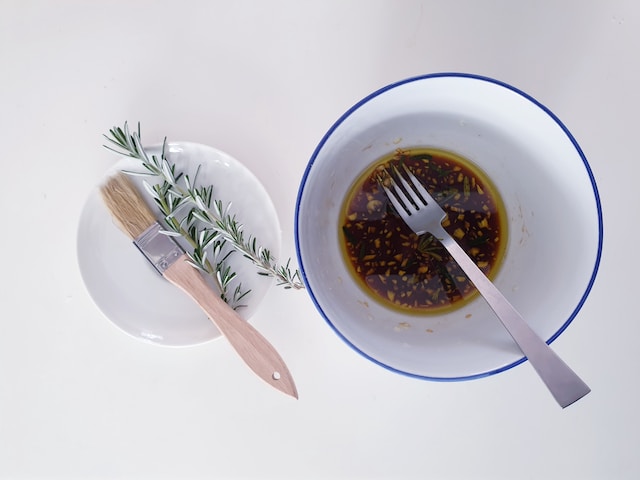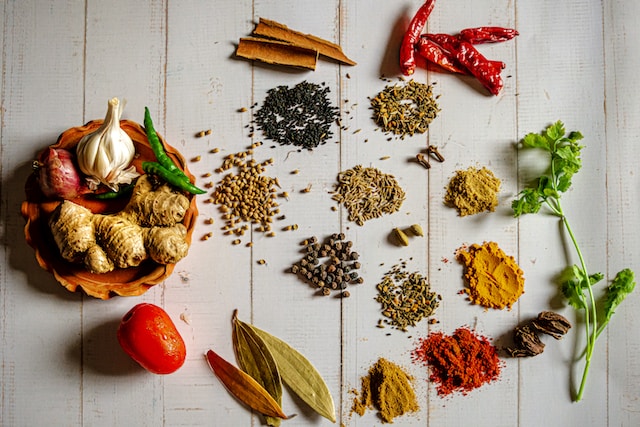Are you tired of lackluster marinades that don’t excite your taste buds? Look no further than the vast array of spices available to elevate your marinade game. Spices for marinades are the secret to taking your dishes from dull to delicious. Whether you’re grilling, roasting, or stir-frying, there’s a perfect blend of spices for marinades to add that extra punch of flavor. Get ready to explore the world of spices for marinades and discover the amazing flavor combinations waiting for you. Let’s spice up your next dish and make it a culinary masterpiece!
Tips to Choose the Best Spices for Marinades

Choosing the right spices for your marinade can make a big difference in the flavor of your dish. Here are some tips to help you choose the best spices for your marinade:
✓ Consider the protein
When choosing spices for your marinade, think about the flavor profile of the protein you’re using. For example, if you’re marinating chicken, you might want to consider using spices that have a natural affinity with poultry, such as rosemary, thyme, and sage. These herbs not only add flavor but also help tenderize the meat. You could also add a touch of paprika or cayenne pepper to give the chicken a spicy kick.
✓ Think about the cuisine
Spices play a critical role in the cuisine of different cultures, so incorporating spices that are traditionally used in certain cuisines can take your marinade to the next level. For example, if you’re making a Middle Eastern-inspired marinade for lamb, consider using spices like cumin, coriander, and cinnamon, which are commonly used in this cuisine. You could also add some fresh mint leaves to give the marinade a fresh, herbaceous flavor.
✓ Don’t overdo it
When it comes to using spices in marinades, less is often more. You don’t want to overwhelm the natural flavor of the meat with too many spices. Instead, focus on using a few key spices that complement each other and the protein you’re marinating. For example, if you’re marinating steak, you could use a combination of black pepper, garlic, and rosemary. These three spices work well together to enhance the flavor of the beef without overpowering it.
✓ Consider the cooking method
The cooking method you plan to use can also influence the spices you choose for your marinade. If you’re grilling or smoking your meat, you might want to use spices that can stand up to the high heat and smoke. For example, you could use a blend of smoked paprika, cumin, and chili powder to give your meat a rich, smoky flavor.
✓ Experiment
When it comes to choosing spices for your marinade, don’t be afraid to experiment and try new combinations. You might be surprised at how different spices can work together to create unique and delicious flavors. For example, you could try using a blend of ginger, soy sauce, and honey for an Asian-inspired marinade that works well with chicken or beef. Or, you could use a combination of turmeric, cumin, and cardamom for a flavorful Indian-inspired marinade that goes well with lamb or chicken. The possibilities are endless, so have fun and get creative!
Whole vs Ground Spices for Marinades
Here are some creative and original ways to expand on the factors to consider when choosing between whole and ground spices for marinades:
◼ Whole Spices:
Flavor: Whole spices contain all of the essential oils and volatile compounds that give them their characteristic flavor and aroma. When using whole spices in your marinade, you’ll notice that the flavor is more complex and multi-dimensional than with ground spices. For example, whole cumin seeds have a bright, citrusy flavor when toasted, which is lost when ground. Whole coriander seeds have a sweet, floral aroma that is more subtle when ground.
Freshness: Whole spices tend to stay fresher longer than ground spices because the oils and flavors are better protected from air and light. To get the most out of your whole spices, store them in a cool, dark place and grind them as needed for maximum freshness. You can also experiment with toasting your whole spices before grinding them to enhance their flavor and aroma.
Texture: Whole spices can add a unique texture to your marinade that ground spices cannot. For example, whole cloves can add a slightly crunchy texture and a burst of flavor to your marinade. Similarly, whole cinnamon sticks can infuse your marinade with a subtle cinnamon flavor and a slightly chewy texture.
◼ Ground Spices:
Convenience: Ground spices are more convenient to use than whole spices because they are already in a form that can be easily added to your marinade. They can save you time and effort compared to whole spices, which need to be ground or toasted before using in your marinade. If you’re in a rush or just prefer the ease of using ground spices, they can be a great option.
Flavor: While whole spices have a more complex and multi-dimensional flavor than ground spices, ground spices offer a more uniform and consistent flavor. This can be useful if you want to ensure that every bite of your marinated meat has the same level of spice. Additionally, some spices, like turmeric and paprika, are difficult to grind at home without specialized equipment, so using pre-ground spices can be a good option.
Speed: When you’re in a hurry, ground spices can be a real lifesaver. They don’t require any special equipment or preparation, so you can add them to your marinade quickly and easily. This can be especially useful if you’re making a last-minute meal or if you’re short on time.
Ultimately, the choice between whole and ground spices comes down to your personal preference and the specific recipe you’re using. If you want to experiment with different textures and flavors, whole spices can be a great option. If you’re looking for convenience and consistency, or if you’re short on time, ground spices may be your best bet.
Top 10 Spices for Marinades

✤ Garlic
Roast whole garlic bulbs and add the soft, caramelized cloves to the marinade for a sweet and savory flavor. Alternatively, finely chop garlic and mix it with honey and mustard for a tangy and sweet marinade.
✤ Cumin
Toast whole cumin seeds in a dry pan until fragrant, then grind them into a powder and add to the marinade for an earthy and nutty flavor. Or, mix cumin with yogurt, lemon juice, and honey for a creamy and tangy marinade that’s perfect for chicken or lamb.
✤ Paprika
Mix smoked paprika with olive oil, lemon juice, and honey for a sweet and smoky marinade that’s great for pork or shrimp. Or, mix sweet paprika with garlic, oregano, and red wine vinegar for a classic Spanish-style marinade for beef.
✤ Chili powder
Combine chili powder with lime juice, honey, and olive oil for a tangy and spicy marinade for chicken or fish. Or, mix chili powder with brown sugar, soy sauce, and garlic for a sweet and savory marinade for pork.
✤ Coriander
Toast coriander seeds in a dry pan until fragrant, then grind them into a powder and mix with honey, lime juice, and soy sauce for a sweet and tangy marinade for chicken or tofu. Or, mix coriander with cumin, turmeric, and ginger for a flavorful Indian-style marinade for lamb or beef.
✤ Thyme
Mix fresh thyme leaves with lemon zest, garlic, and olive oil for a bright and herbaceous marinade for chicken or fish. Or, mix dried thyme with Dijon mustard, honey, and red wine vinegar for a tangy and slightly sweet marinade for beef.
✤ Rosemary
Strip fresh rosemary leaves off the stems and mixes with lemon juice, honey, and olive oil for a fragrant and slightly sweet marinade for chicken or lamb. Or, mix dried rosemary with garlic, balsamic vinegar, and honey for a sweet and tangy marinade for pork or beef.
✤ Oregano
Mix fresh oregano leaves with garlic, lemon juice, and olive oil for a bright and citrusy marinade for chicken or fish. Or, mix dried oregano with red wine vinegar, olive oil, and mustard for a tangy and herbaceous marinade for beef or lamb.
✤ Black pepper
Mix freshly cracked black pepper with olive oil, soy sauce, and honey for a simple and flavorful marinade for pork or steak. Or, mix black pepper with garlic, ginger, and sesame oil for a spicy and fragrant marinade for chicken or tofu.
✤ Ginger
Grate fresh ginger and mix with lime juice, honey, and soy sauce for a tangy and slightly sweet marinade for shrimp or salmon. Or, mix ground ginger with garlic, sesame oil, and rice vinegar for a flavorful and slightly sweet marinade for beef or chicken.
Common Mistakes to Avoid When Using Spices for Marinades
✦ Overpowering the flavors
Just like a chef must be careful not to add too much salt to a dish, you also need to watch out for adding too many spices to your marinade. A marinade that has too much of one flavor can become overwhelming and make the meat unappetizing. It’s like going to a concert where the drummer is playing too loudly, and you can’t hear the other instruments.
✦ Using old or stale spices
Imagine trying to make a delicious meal with a chef who only uses ingredients that have been sitting in the pantry for years. Using old or stale spices in your marinade can be just as disappointing. The spices will have lost their potency and will not add the desired flavor to your meat. It’s like trying to make a beautiful painting with dried-up paint.
✦ Not measuring accurately
Precision is key when it comes to cooking, and the same goes for using spices in your marinade. Just like a scientist must be precise with their measurements, you also need to measure your spices accurately to ensure that your marinade is well-balanced. Using too much or too little spice can throw off the flavor of the marinade and ruin the meat. It’s like trying to play a song on a guitar with strings that are either too loose or too tight.
✦ Adding spices too early
Timing is everything when it comes to marinating meat, and adding certain ingredients too early can be detrimental. For example, vinegar and other acidic ingredients can break down meat fibers and make the meat mushy if left in the marinade for too long. It’s like letting a child stay up too late, resulting in a cranky and tired child the next day.
✦ Not marinating for long enough
Patience is a virtue when it comes to marinating meat, and failing to marinate for a sufficient amount of time can result in tough and unappetizing meat. It’s like trying to teach a baby how to walk after only a few minutes of practice. It takes time and repetition to achieve the desired result.
How to Maximize the Effects of Spices on Marinades

☑ Use fresh spices
Growing your own herbs and spices can be a fun and rewarding experience. Not only will you have fresh ingredients at your disposal, but you’ll also have the satisfaction of knowing that you’ve grown them yourself. If you don’t have a garden, you can still find fresh spices at your local farmer’s market.
☑ Toast the spices
To add an extra layer of depth to your marinade, consider toasting your spices with other aromatics like garlic or shallots. This can create a complex and rich flavor profile that will take your dish to the next level.
☑ Grind the spices
Experiment with grinding different spices together to create unique spice blends. For example, you could grind together cinnamon, nutmeg, and cloves to create a warm and comforting flavor profile that’s perfect for fall dishes.
☑ Use acidic ingredients
Try adding different types of acid to your marinade, like lime juice or balsamic vinegar, to create a bright and tangy flavor profile. You can also experiment with using different types of yogurt, like Greek yogurt or coconut yogurt, to add a creamy and slightly tangy flavor to your marinade.
☑ Marinate for longer
For a truly flavorful and tender result, try marinating your meat for 24-48 hours. This will give the spices plenty of time to penetrate the meat and create a deep and complex flavor. If you don’t have that much time, you can still create a flavorful marinade by using a vacuum sealer to speed up the process.
☑ Use enough salt
Salt is an important ingredient that can help enhance the flavors of your spices. Try experimenting with different types of salt, like smoked sea salt or Himalayan pink salt, to add extra depth to your marinade.
☑ Adjust the heat level
To add a little extra kick to your marinade, try using different types of peppers, like jalapeños or habaneros. You can also add a pinch of cayenne pepper or paprika for a milder heat. For a smoky flavor, you could try using chipotle powder.
By experimenting with these tips, you can create unique and flavorful marinades that will elevate any dish.
Bonus: Common Marinated Dishes That Uses Spices
✱ Tandoori chicken
Tandoori chicken is a classic Indian dish that is marinated in a blend of yogurt and spices before being cooked in a tandoor oven. The marinade is usually made with a combination of fragrant spices such as cumin, coriander, turmeric, ginger, and garam masala, which give the chicken a vibrant yellow color and a spicy, tangy flavor. To make the dish even more exciting, you can try using different types of yogurt, such as Greek yogurt or coconut yogurt, to create a creamy and flavorful marinade.
✱ Jerk chicken
Jerk chicken is a traditional Jamaican dish that is famous for its bold, spicy flavor. The chicken is marinated in a mixture of spices such as allspice, cinnamon, nutmeg, and ginger, along with fiery Scotch bonnet peppers, garlic, and onion. The marinade is then grilled over an open flame, which gives the chicken a smoky flavor and a crispy crust. To make the dish even more creative, you can experiment with different types of fruit juices and rum to add a tropical twist to the marinade.
✱ Fajitas
Fajitas are a Tex-Mex classic that is perfect for any casual dinner party. The dish usually consists of marinated grilled meat, such as beef or chicken, along with sautéed peppers and onions, all served on a sizzling hot plate. The marinade is usually made with a blend of spices such as cumin, chili powder, smoked paprika, and garlic, which give the meat a smoky and savory flavor. To make the dish more creative, you can try using different types of meat, such as shrimp or tofu, or experiment with different types of vegetables, such as zucchini or mushrooms.
✱ Shawarma
Shawarma is a popular Middle Eastern dish that is made by marinating meat, usually chicken or lamb, in a blend of spices and yogurt before roasting it on a spit. The marinade usually contains spices such as cumin, coriander, paprika, and turmeric, which give the meat a warm and earthy flavor. To make the dish more creative, you can try using different types of yogurt, such as labneh or goat yogurt, or experiment with different types of marinades, such as lemon and herb or garlic and tahini.
✱ Korean barbecue
Korean barbecue is a fun and interactive dish that is perfect for entertaining guests. The dish usually consists of marinated grilled meat, such as beef or pork, along with a variety of dipping sauces, lettuce leaves, and rice. People usually make the marinade by blending spices such as garlic, ginger, sesame oil, and soy sauce, to give the meat a rich and savory flavor. To make the dish more creative, you can try using different types of meat, such as duck or quail, or experiment with different types of dipping sauces, such as sweet chili or peanut.
✱ Adobo chicken
Adobo chicken is a classic Filipino dish that is popular for its bold and tangy flavor. The chicken is marinated in a mixture of vinegar, soy sauce, garlic, and spices such as bay leaves, black pepper, and oregano. The marinade is then simmered with the chicken until the meat is tender and juicy. To make the dish more creative, you can try using different types of vinegar, such as coconut vinegar or apple cider vinegar, or experiment with different types of meat, such as pork or fish.
Final Words
And there you have it: a whirlwind tour of the wonderful world of spices for marinades! From the pungent punch of garlic to the warm, comforting notes of cinnamon, there’s a spice out there for every taste and occasion. So next time you’re whipping up a marinade, don’t be afraid to experiment with different spices and flavors – who knows what delicious combinations you might come up with! Happy cooking, and may your marinades always be bursting with flavor.
